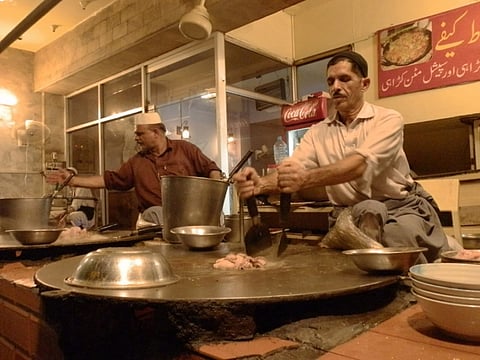Sweet experiences of Eid in Lahore
The traditional, much-loved cuisine of Pakistan finds full expression on the streets of the old city

LAHORE: There is a saying in Lahore that Eid Al Fitr is not complete if you do not eat pheni. A sweet preparation made with milk, vermicelli and sugar, pheni is a must-have during Eid. After all, Eid Al Fitr is also called meethi (sweet) Eid.
During the joyous occasion, the air in the marketplace quite literally turns aromatic as a staggering range of traditional sweets, savouries, kebabs and curries are made. The streets of Lahore come alive with a range of olfactory stimuli as Eid draws the young and the old to enjoy these traditional foods. Pheni is made especially on the occasion of Eid Al Fitr.
People usually eat it as a light breakfast dish before Eid prayers. There are two kinds of pheni — handmade and factory made. Mian Sajjad’s family shop in old Gowalmandi area, that’s been in business for five decades, sells handmade pheni.
“My father used to run this business. Now I am running the shop. We are continuing with the age-old tradition [of handmade phenis] because our customers demand it. These are more tasty,” Mian said.
Different kinds of sherbets on display at a street in Lahore.
Other traditional food items for breakfast are bakarkwani (saltish in taste and usually eaten with tea), khund kulcha (sweet naan bread) and hareesa (a dish made from pulses and mixed with beef or mutton and eaten as a hot dish).
The Famous Amritsari hareesa shop on Nisbet Road is the oldest outlet that’s been in business for 75 years. Irshad sahib, who runs this family business, says that even though the weather is very hot, he expects a lot of customers. “It is traditional for people to at least have one meal of hareesa [during Eid]. We used to do business only in the mornings, but due to the increase in demand, we are now open from early morning till the late hours.”
The traditional harissa, made with red meat, is now is also being made with chicken due to the changing palate. “Children especially love to eat chicken hareesa,” Irshad said.
Other dishes in demand
Other traditional dishes that continue to be in demand include barbecued meats, which are now enjoying influences of Iranian and Turkish adaptations. However, the Lahori tikka and kebabs continue to be among the top favourites. The Lahori tikka is a masterpiece of succulence as the meat is marinated for at least 12 to 20 hours before it is cooked.
Other favourites are the karahi and kunna (rich, one-pot mutton or beef dishes slow-cooked in earthen pots with a medley of spices).
Adil Nawaz, a cameraman with a Pakistani television channel, works as a food caterer serving ancestral family recipes that are greatly relished by customers. “I can claim that we prepare the best beef kebabs in the world,” he says. “It is our family recipe. We have a marination mix that is only known to us and this is what makes our kebabs so distinctly different, and better than what the rest offer,” he says.
Despite the influx of Western fast food chains and their influence, the lure of traditional Pakistani cuisine remains undimmed, say owners of restaurants.
Though some young people go for iftar, sehri and other meals form these international brands, a majority prefer to enjoy traditional cuisine. Uzma Aleem, professor at the Lahore College for Women University, says, “I love to try out different cuisines like French, Italian and Mexican, but I relish our traditional dishes the most. They are simply delicious.”
Sign up for the Daily Briefing
Get the latest news and updates straight to your inbox



